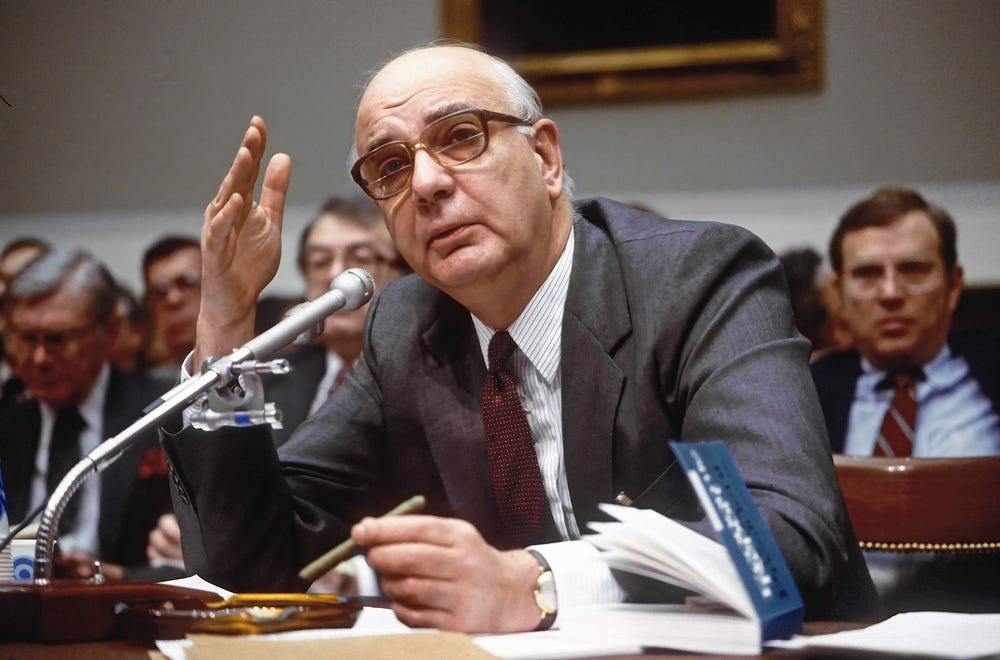Remembering Paul Volcker amid today’s destruction of government
Monetary policy is important, but it cannot sustain global leadership.

Paul Volcker was a towering figure in every respect. His career in government, capped by service as chairman of the Federal Reserve, had been courageous and exemplary. Widely and accurately lauded as the man who ended horrendous inflation in the late 1970s, he was one of a handful of figures held in high respect across the spectrum—and around the world--for his savvy, integrity, acumen and decency.
I first met Volcker in 1988. I had joined with a small group of Washington pros, including former European Union Ambassador Bob Schaetzel, former all-everything Elliot Richardson, former U.S. Information Agency Director Leonard Marks and former Comptroller General Elmer Staats, to brainstorm ways to make government work better for the good of society, including dealing with the problems of the civil service and implementation of government programs and services. Our main idea was to create a blue ribbon commission, and we had only one candidate to chair it.
Our small group became the governing board of the National Commission on Public Service, widely known as the Volcker Commission. Our other members were a remarkable group of dignitaries, included Gerald Ford, the Rev. Ted Hesburgh, Donna Shalala, Gen. Andy Goodpaster, Douglas Fraser, John Gardner, Walter Mondale, and more. Our executive director, Bruce Laingen, had courageously led the 53 hostages held prisoner in Teheran for more than a year until released on Jan. 20, 1981. Though most of our commission members only saw Volcker during our hearings and meetings, our governing group and Laingen met with him frequently to discuss strategy and substance.
Illustrious as the group was, we had one clear leader: Volcker. His knowledge of government and commitment to public service were unparalleled, and his stature enabled us at least to get a face-to-face meeting in the White House with President George H.W. Bush. Our report was powerful, but, in keeping with most efforts at governmental reform, only a few of its recommendations were enacted.
When Volcker left the Fed, he went into the investment business. His goal was not to accumulate vast sums of money to live like a billionaire. He wanted to use a significant portion of his wealth to complete the goal of reforming government and encouraging some of our best and brightest to commit to careers in public service. We kept in touch frequently thereafter and batted around ideas about how he could use his resources to ensure that the government we had was efficient, streamlined, corruption-free, and managed with integrity by experts, and that the goal of a career in public service became more prominent and ingrained in the society. Though a robust and functioning economy was of course a driving motivation for him, so was the broader sense of ensuring that, whatever one’s preferences for the size of government, it would be the best the nation had to offer.
Our conversations centered on what kind of organization he might create or support and where it should be housed—a university, a think tank or somewhere else. In the end, the compelling choice was to create a new and independent group, which became the Volcker Alliance, on whose board I have sat since it was created in 2013. Since his death in 2019, it has been chaired by the remarkable Bill Bradley, former senator from New Jersey.
When Volcker was in his final stages, at age 92, he asked me to come to his apartment in New York to talk about the future. He, as I, was shaken by what had happened to the society and governance with the rise and presidency of Donald Trump. He wanted to be sure that the fight to maintain a decent society and a functioning government would continue. In 2018, he had co-written a memoir recounting his life and career; for the paperback edition, in 2020, he wrote the following afterword. We are sharing it here because of its prescience and its source.
Afterword to Paul A. Volcker’s memoir “Keeping at It”
*****
When I finished writing this book, late in the summer of 2018, it was already clear that the United States – and the world order it had helped establish during my lifetime – were facing deep-seated political, economic, and cultural challenges. I concluded with a bit of reassurance: My mother’s reminder that the United States had endured a brutal civil war, two world wars, a great depression, and still emerged as the leader of the “free world,” a model for democracy, open markets, free trade, and economic growth. That was for me a source of both pride and hope.
Today, threats facing that model have grown more ominous, and our ability to withstand them feels less certain. Increasingly, by design or not, there appears to be a movement to undermine Americans’ faith in our government and its policies and institutions. We’ve moved well beyond Ronald Reagan’s credo that “government is the problem,” with its aim of reversing decades of federal expansion. Today we see something very different and far more sinister. Nihilistic forces are dismantling policies to protect our air, water, and climate. And they seek to discredit the pillars of our democracy: voting rights and fair elections, the rule of law, the free press, the separation of powers, the belief in science, and the concept of truth itself.
Without these, the American example that my mother so cherished will revert to the kind of tyranny that once seemed to be on its way to extinction – though, sadly, it remains ensconced in some less fortunate parts of the world.
*****
In the original edition of this book, I observed that Trump had not attacked the independent Federal Reserve, for which I was grateful. To say that is no longer true would be an understatement. Not since just after World War II have we seen a president so openly seek to dictate policy to the Fed. That is a matter of great concern, given that the Federal Reserve is one of our key government institutions, carefully designed to be free from partisan attacks. I trust that the members of the Federal Reserve Board itself, the members of Congress responsible for Fed oversight, and indeed the public at large will maintain the Fed’s ability to act in the nation’s interest, free of partisan political purposes.
Monetary policy is important, but it cannot by itself sustain global leadership. We need open markets and strong allies to support economic growth and the prospects for peace. Now, instead, confidence in the United States is under siege.
Seventy-five years ago, Americans rose to the challenge of vanquishing tyranny overseas. We joined with our allies, keenly recognizing the need to defend and sustain our hard-won democratic freedoms.
Today’s generation faces a different but equally existential test. How we respond will determine the future of our own democracy and, ultimately, of the planet itself. There is a need to “keep at it.” It cannot be set aside.
* Excerpted from Keeping At It: The Quest for Sound Money and Good Government by Paul A. Volcker and Christine Harper. Copyright © 2020. Available from PublicAffairs, an imprint of Hachette Book Group, Inc.
Norman Ornstein is a political scientist, co-host of the podcast “Words Matter,” and author of books, including “It’s Even Worse Than It Looks: How the American Constitutional System Collided With the New Politics of Extremism.”






I had the great privelege of working under Volcker at the Federal Reserve Board from 1980-1984. He was then, and remains now, my hero. His complete courage and integrity to do what was right for the country in the face of great opposition from Reagan was a great inspiration to me. As a person, he was larger than even his physical presense at 6 feet 7 inches. Our country needs more Paul Volckers and fewer Donald Trumps.
On the topic of economy, today's article in Reuters headline is "Trump administration withholding $436.87 billion in approved spending, top Democrats say". After all the outcry, the polls, the demonstrations, town halls, and still...What now???